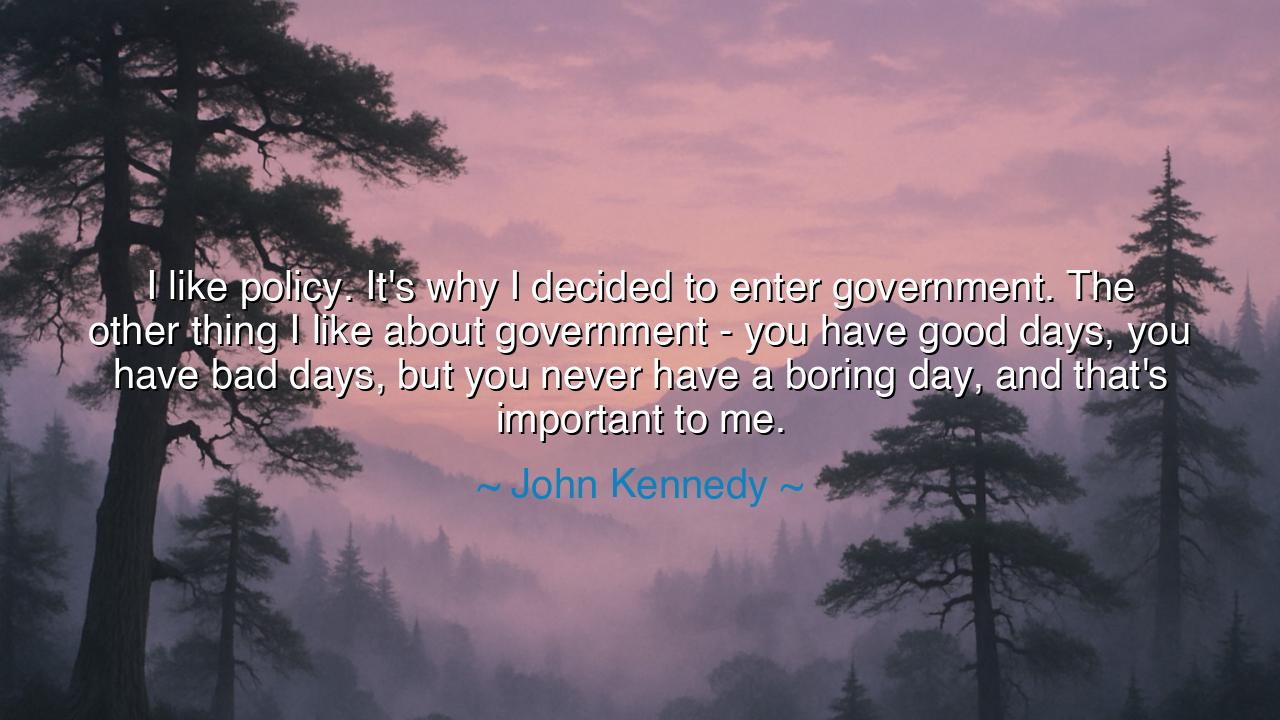
I like policy. It's why I decided to enter government. The other
I like policy. It's why I decided to enter government. The other thing I like about government - you have good days, you have bad days, but you never have a boring day, and that's important to me.






"I like policy. It's why I decided to enter government. The other thing I like about government - you have good days, you have bad days, but you never have a boring day, and that's important to me." – John Kennedy
In these earnest and spirited words, John Kennedy, a man of intellect and action, speaks not as a distant politician, but as a craftsman of public service. His statement reflects the noble heart of governance—not as a pursuit of power or prestige, but as a lifelong dialogue with the destiny of one’s nation. When he says, “I like policy,” he reveals his devotion to the craft of leadership, the art of shaping human lives through vision, reason, and courage. And when he adds that government is never boring, he gives voice to a truth known to all who serve with purpose: that the work of guiding a people is the work of life itself—ever-changing, ever-challenging, ever-demanding the full strength of the human spirit.
The origin of this quote lies in Kennedy’s reflection on his own journey into public life. Long before he was President, even as a young senator, he spoke often of how policy—the delicate weaving of ideas into action—was what drew him to government. To him, policy was philosophy applied, the means by which ideals took flesh in the real world. It was not enough to dream of justice, prosperity, or peace; one had to labor in the often messy machinery of governance to bring those dreams into being. Kennedy understood that the true calling of leadership was not glory but service, not ease but effort. Thus, his joy was found not in the comfort of certainty, but in the struggle toward progress.
His words carry the same spirit that once stirred the hearts of ancient statesmen and philosophers. Aristotle taught that man, being a political creature, finds his noblest expression in serving the polis—the city, the community. So too did Kennedy see government as the arena of human purpose, where intellect and moral conviction meet the world’s practical needs. The phrase “you have good days, you have bad days” acknowledges the inevitability of trial and error in this endeavor. Policy, after all, is born in imperfection—it evolves through debate, compromise, and revision. Yet Kennedy’s resilience shines through his final remark: that even amidst frustration, one must never succumb to boredom or cynicism. For boredom is the death of the spirit, while challenge is its renewal.
Consider the story of Franklin D. Roosevelt, who guided America through the Great Depression. Each day brought new crises—banks collapsing, farmers starving, families despairing. Yet Roosevelt, like Kennedy after him, thrived in that crucible of difficulty. His mind was alive with questions: How to restore faith? How to put men back to work? How to balance hope with realism? His energy sprang not from ease, but from engagement. For men like Roosevelt and Kennedy, the unpredictable rhythm of governance—its triumphs and its trials—was not a burden but a source of vitality. It gave meaning to their days and purpose to their years.
Kennedy’s reflection also reveals a truth about happiness and vocation. He teaches that fulfillment comes not from a life free of hardship, but from one full of meaningful struggle. To live well is to live deeply, to embrace one’s calling with heart and mind. The public servant who faces criticism yet continues to serve; the teacher who meets obstacles yet continues to teach; the parent who faces chaos yet continues to nurture—all live by the same principle that animated Kennedy’s words. A life that challenges you will never bore you, and a life that bores you will never fulfill you.
His quote, simple though it may sound, hides a profound wisdom: that joy is found not in avoiding difficulty but in engaging with it wholeheartedly. The work of government, like the work of life, is filled with uncertainty, opposition, and imperfection—but within that struggle lies the possibility of greatness. For Kennedy, even failure in pursuit of the good was more honorable than comfort in indifference. The alternating “good days and bad days” were not setbacks; they were the rhythm of purpose itself.
The lesson we must draw from Kennedy’s words is that passion and perseverance sanctify all labor. Whether one serves in high office or humble duty, the key is to find joy in the process, to see each challenge as a test of one’s spirit. Seek work that matters, not work that is easy. Embrace both victory and defeat as teachers. Above all, refuse the dullness of apathy—for apathy is the true enemy of civilization. When we engage deeply, think bravely, and act faithfully, our days—good or bad—will never be boring, because they will be alive.
Thus, Kennedy’s quote becomes not just the reflection of a leader, but the creed of all who wish to live meaningfully. Let his words remind us that to serve one’s community, to shape one’s world, and to stand firm amid uncertainty is the highest calling of the human soul. For in such a life, the spirit never stagnates, and the flame of purpose burns bright—lighting the path for generations yet to come.






AAdministratorAdministrator
Welcome, honored guests. Please leave a comment, we will respond soon